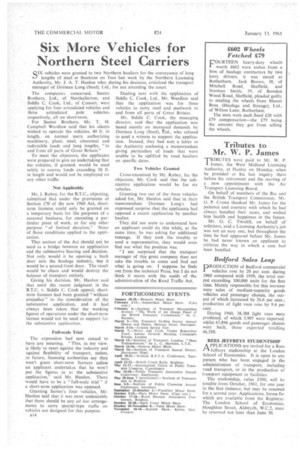Six More Vehicles for Northern Steel Carriers
Page 48

If you've noticed an error in this article please click here to report it so we can fix it.
QIX vehicles were granted to two Northern hauliers for the conveyance of long lengths of steel at Stockton on Tees last week by the Northern Licensing Authority, Mr. J. A. T. Hanlon who, during his decision, criticized the transport manager of Dorman Long (Steel), Ltd., for not attending the court.
The companies concerned, Sunter Brothers, Ltd., of Northallerton, and Siddle C. Cook, Ltd., of Consett, were applying for four articulated vehicles and three articulated pole vehicles. respectively, all on short-term.
For Sunter Brothers, Mr. T. 11. Campbell Wardlaw said that his clients wished to operate the vehicles, 40 ft. in length, on normal users authorizing machinery, plant, steel, abnormal and indivisible loads and long lengths, "to and from all parts of Great Britain."
To meet the objectors, the applicants were prepared to give an undertaking that the vehicles, if granted, would be used solely to convey loads exceeding 30 ft. in length and would not be employed on any other traffic.
Not Applicable Mr. I. Robey, for the B.T.C., objecting, submitted that under the provisions of Section 170 of the new 1960 Act, shortterm licences could only be granted on a temporary basis for the purposes of a seasonal business, for executing a particular piece of work, or for any other purpose "of limited duration." None of those conditions applied to the application.
That section of the Act should not be used as a bridge between an application and the substantive hearing and decision. Not only would it be opening a back door into the haulage industry, but it would be a second front door. The result would be chaos and would destroy the balance of transport entirely.
Giving his decision. Mr. Hanlon said that until the recent judgment in the B.T.C. v. Siddle C. Cook appeal, shortterm licences had been granted "without prejudice" to the consideration of the substantive application, and it had always been taken that the working figures of operations under the short-term licence would not be used as support for the substantive application.
Full-scale Trial The expression had now ceased to have any meaning. "This, in my view. is likely to react against the industry and against flexibility of transport, unless, in future, licensing authorities say they won't grant short-term licences unless an applicant undertakes that he won't put the figures in at the substantive application," said Mr. Hanlon. There would have to be a "full-scale trial" if a short-term application was opposed.
Granting Sunter's four vehicles, Mr. Hanlon said that it was most undesirable that there should be any ad hoc arrangements to carry special-type traffic on vehicles not designed for that purpose.
Dealing next with the application of Siddle C. Cook, Ltd., Mr. Wardlaw said that the application was for three vehicles to carry steel and steelwork to and from all parts of Great Britain, Mr. Siddle C. Cook, the managing director, said that the application was based mainly on increased demands by Dorman Long (Steel), 'td., who refused to send a witness to support the application. Instead, they had sent a letter to the Authority enclosing a memorandum giving particulars of loads that were unable to be uplifted by road hauliers on specific dates.
Two Vehicles Granted Cross-examined by Mr. Robey, for the objectors, Mr. Cook said that the substantive application would be for six vehicles.
Granting two out of the three vehicles asked for, Mr. Hanlon said that in their memorandum Dorman Long's had expressed surprise that the applicants had opposed a recent application by another haulier.
They did not seem to understand how an applicant could do this while, at the same time, he was asking for additional tonnage. If they took the trouble to send a representative, they would soon find out what the position was.
"I am surprised that the transport manager of this great company does not take the trouble to come and find out what is going on. I suppose he finds out from the technical Press, but I do not think it meets with the needs of the administration of the Road Traffic Act.




















































































































































